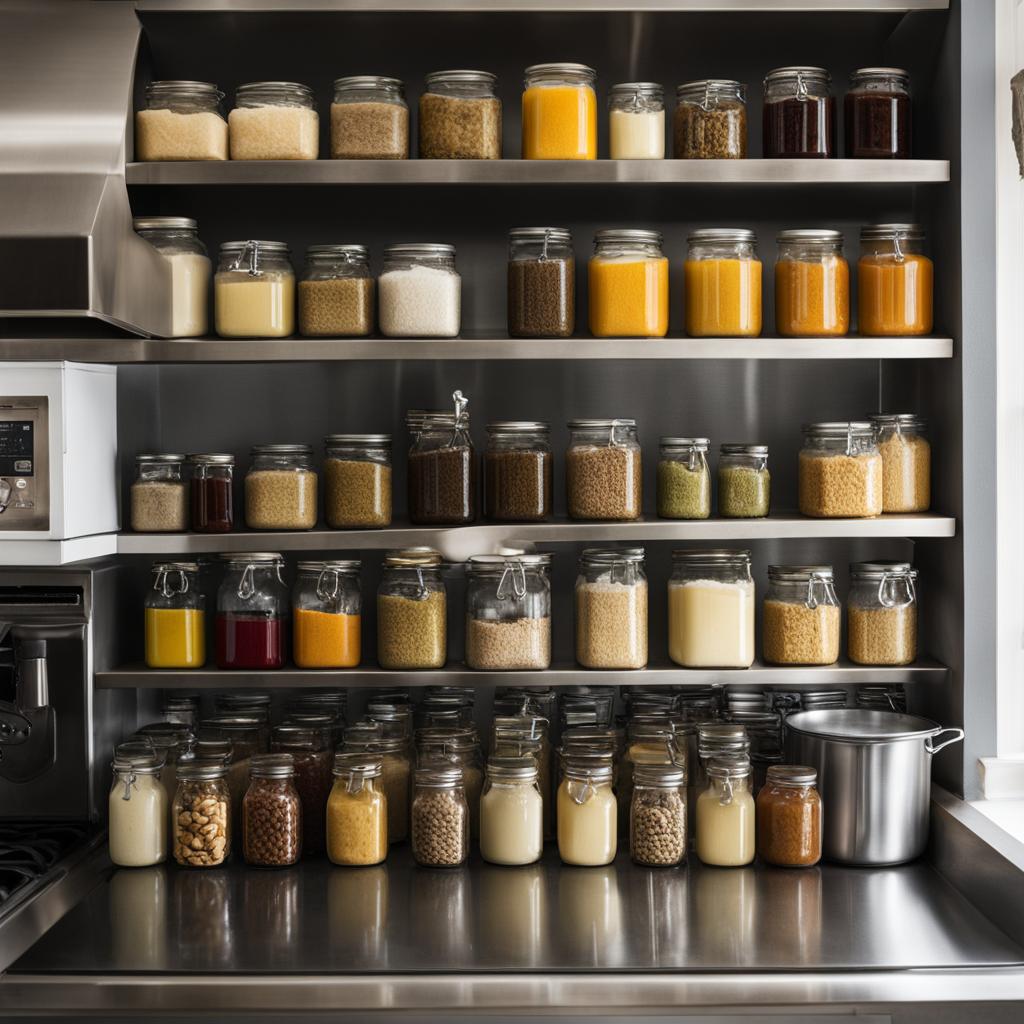Welcome to my guide on how to determine if your chicken broth has gone bad. Whether you’re using homemade broth or store-bought chicken broth, it’s important to know when it’s time to toss it out for your own safety. In this article, I will share some simple and identifiable ways to tell if your chicken broth is still fresh and safe to eat. By paying attention to the signs of spoilage, you can ensure that your chicken broth is of the highest quality.
Key Takeaways:
- Smell, color, appearance, and taste are the four telltale signs to look for when determining if chicken broth has gone bad.
- Chicken broth can go bad like any other perishable food if it is not stored or handled properly.
- Signs of spoiled chicken broth include a sour smell, off odor, color change, mold, curdled or slimy texture, and off flavor.
- The shelf life of chicken broth varies depending on the type and storage method.
- Using bad chicken broth can pose health risks and negatively impact the taste and quality of your dishes.
Does Chicken Broth Go Bad?
Yes, chicken broth is a perishable food item and can go bad if not stored or handled properly. It has a limited shelf life, and its freshness can deteriorate over time. The spoilage of chicken broth can be indicated by off flavors, odors, and textures that develop as it ages. It’s important to pay attention to these signs to determine if the chicken broth has gone bad and should be discarded.
Chicken broth should be treated like any other perishable food. It should be stored in the refrigerator at or below 40°F (4°C). This helps slow down bacterial growth and extend its shelf life. If the broth has been opened, it should be consumed within 3-4 days. However, if the broth has an unusual smell, color, or texture, it’s best to err on the side of caution and discard it.
Proper storage and handling are crucial in maintaining the quality and safety of chicken broth. Always ensure that the broth is stored in airtight containers to prevent contamination. If you plan to keep chicken broth for a longer period, freezing is the best option. It can extend the shelf life of the broth for up to 6 months. Just make sure to label the containers or bags with the date and type of broth for easy identification.
| Signs of Spoilage | Indications of Bad Chicken Broth |
|---|---|
| Off flavors | Unpleasant or sour taste |
| Odors | Rancid or off smell |
| Textures | Curdled, slimy, or grainy consistency |
“Proper storage and handling are crucial in maintaining the quality and safety of chicken broth.”
Remember, when in doubt, it’s always better to be safe than sorry. If you suspect that your chicken broth has gone bad, it’s best to discard it to prevent any potential foodborne illnesses. By being aware of the signs of spoilage and following proper storage practices, you can enjoy safe and flavorful chicken broth in your recipes.
How to Tell If Chicken Broth Is Bad
When it comes to determining if chicken broth is bad, there are a few key indicators to look out for. One of the first signs of spoilage is a sour smell or an off odor. If your chicken broth has a strange or unpleasant aroma, it’s best to avoid consuming it. (SEO: how to tell if chicken broth is bad, sour smell, off odor)
Another telltale sign of bad chicken broth is a noticeable color change. If the broth has turned yellowish or brownish in hue, it may indicate that it has gone bad. Additionally, be sure to check the appearance of the broth. Mold growth on the surface or a curdled or slimy texture are clear signs of spoilage. (SEO: color change, mold, curdled texture, slimy texture)
Lastly, trust your taste buds. If the chicken broth has an off flavor or tastes sour, it is no longer safe to consume. It’s important to note that consuming bad chicken broth can pose health risks, so it’s always better to err on the side of caution and discard any broth that shows signs of spoilage. (SEO: off flavor)
| Signs of Bad Chicken Broth | Actions to Take |
|---|---|
| Sour smell or off odor | Do not consume |
| Color change (yellowish or brownish) | Do not consume |
| Mold growth or curdled/slimy texture | Do not consume |
| Off flavor or sour taste | Do not consume |
By being aware of these signs and taking the necessary precautions, you can ensure the safety and quality of your chicken broth. It’s always better to be safe than sorry when it comes to food safety, so don’t hesitate to discard any chicken broth that you suspect may be spoiled. (SEO: chicken broth is bad, spoilage)
How Long Does Chicken Broth Last?
Knowing the shelf life of chicken broth is essential for ensuring its freshness and determining when it has gone bad. The duration for which chicken broth remains safe to consume depends on various factors, including whether it is homemade, canned, boxed, or frozen. Let’s take a closer look at the shelf life of each type:
| Type of Chicken Broth | Shelf Life |
|---|---|
| Homemade Chicken Broth | Lasts up to 5 days in the refrigerator when stored in an airtight container. |
| Canned Chicken Broth | Lasts up to a year unopened in a cool place, and up to 7 days once opened. |
| Boxed Chicken Broth | Can last for a long time unopened, but is best consumed within 3-4 days once opened. |
| Frozen Chicken Broth | Can last up to 6 months in the freezer. |
It is important to note that these timeframes are general guidelines and can vary depending on storage conditions and the quality of the broth. Always check the best-by or expiration date on the packaging for more accurate information on the freshness of your chicken broth.
Using Bad Chicken Broth: Risks and Consequences
Using bad chicken broth can have serious risks and consequences for your health. One of the main concerns is the potential for food poisoning. Bad chicken broth can contain harmful bacteria, such as Salmonella, which can cause gastrointestinal problems and other health issues. Consuming spoiled broth can lead to symptoms like nausea, vomiting, diarrhea, and abdominal pain. In severe cases, it can even result in hospitalization.
Aside from the risk of food poisoning, bad chicken broth can also negatively affect the taste and quality of your dishes. Spoiled broth can have off flavors, odors, and textures that can ruin the overall taste of your food. It can make your dishes taste sour, bitter, or simply unpleasant. The presence of mold, curdled texture, or slimy consistency in the broth are clear signs that it’s no longer suitable for consumption.
It’s crucial to prioritize food safety and discard any chicken broth that shows signs of spoilage. It’s always better to be cautious and avoid the potential risks and consequences of using bad broth. When in doubt, trust your senses. If the broth smells off, looks strange, or tastes unusual, it’s best to err on the side of caution and dispose of it.
The Risks of Bacterial Contamination
One of the main dangers of using bad chicken broth is the presence of bacteria. Salmonella is a common bacterium found in spoiled chicken broth. It can survive in the broth even after cooking and cause food poisoning when consumed. Symptoms of Salmonella infection include fever, diarrhea, abdominal cramps, and dehydration. People with compromised immune systems, young children, and the elderly are especially vulnerable to the effects of bacterial contamination.
The Impact on Taste and Quality
Using bad chicken broth can significantly impact the taste and quality of your dishes. Spoiled broth can introduce off flavors and odors that can make your food unappetizing. It can also alter the texture, resulting in a curdled or slimy consistency. These changes can be especially noticeable in soups, sauces, and other recipes where the broth plays a prominent role. To ensure the best culinary experience, it’s crucial to use fresh and properly stored chicken broth.
Prioritizing Food Safety
To avoid the risks and consequences of using bad chicken broth, it’s important to prioritize food safety. Follow proper storage guidelines for homemade or store-bought broth, such as refrigeration or freezing. Pay attention to the signs of spoilage, such as off smells, unusual colors, and unusual textures. When in doubt, trust your senses and discard any broth that shows signs of spoilage. By practicing good food safety habits, you can protect yourself and your loved ones from potential health issues.
How to Freeze Chicken Broth
Freezing chicken broth is a simple and effective way to extend its shelf life and minimize waste. By properly freezing chicken broth, you can ensure that it stays fresh and ready to use whenever you need it. Here are some steps to follow when freezing chicken broth:
- Cool the Chicken Broth: Allow the chicken broth to cool completely to room temperature before freezing it. This will help prevent the growth of harmful bacteria.
- Portion into Ice Cube Trays: Pour the cooled chicken broth into ice cube trays. This method allows for easy portioning and thawing later on. Be sure to leave some space at the top of each cube to account for expansion during freezing.
- Label the Containers: Once the chicken broth is frozen into cubes, transfer them into airtight containers or resealable bags. Label the containers with the date and type of broth to keep track of freshness.
- Store in the Freezer: Place the labeled containers in the freezer and ensure they are stored upright to prevent any leakage. Chicken broth can be frozen for up to 6 months.
To thaw the frozen chicken broth, simply transfer the desired number of cubes to the refrigerator and allow them to thaw overnight. You can also place the container or bag of frozen broth in a bowl of cold water to speed up the thawing process. Avoid thawing chicken broth on the countertop, as this can promote bacterial growth.
Benefits of Freezing Chicken Broth
Freezing chicken broth comes with several benefits. First and foremost, it helps to extend the shelf life of the broth, allowing you to stock up and use it as needed. This can be especially helpful when you have excess broth that needs to be preserved.
Freezing chicken broth in ice cube trays also provides convenient portion control. Each cube is equivalent to a small amount of broth, making it easy to thaw and use only what you need for your recipes. This saves you from having to defrost an entire container of broth when you only require a small quantity.
Furthermore, freezing chicken broth in labeled containers helps with organization. By clearly marking the date and type of broth, you can easily keep track of its freshness and avoid any confusion in your freezer.
Recommended Tools for Freezing Chicken Broth
When it comes to freezing chicken broth, there are a few tools that can be beneficial:
- Ice Cube Trays: Opt for silicone ice cube trays, as they are flexible and make it easier to remove the frozen broth cubes.
- Airtight Containers or Resealable Bags: These are essential for storing the frozen broth cubes. Make sure they are leak-proof to prevent any mess in the freezer.
Using these tools will help you freeze and store chicken broth effectively, ultimately extending its shelf life and ensuring its quality when you’re ready to use it.
Tools and Storage Equipment for Chicken Broth

When it comes to storing chicken broth, having the right tools and equipment can make all the difference in maintaining its quality and freshness. Here are some essential items to consider:
- Weck Jars: These glass jars with tight lids are perfect for storing homemade chicken broth. They come in various sizes, allowing you to portion and store your broth conveniently.
- Silicone Ice Cube Trays: These flexible ice cube trays make it easy to freeze and store chicken broth in small, manageable portions. Once frozen, you can transfer the broth cubes to a freezer bag for easy access.
- Reusable Storage Bags: For those looking for a more sustainable option, reusable storage bags are a great choice. These bags are made of food-grade silicone or a similar material, ensuring that your chicken broth stays fresh and leak-free in the freezer.
By using these tools and storage equipment, you can ensure that your chicken broth remains well-preserved and ready to use whenever you need it. Remember to label your containers with the date and type of broth to keep track of freshness.
The Difference Between Chicken Broth and Stock
When it comes to cooking, understanding the difference between chicken broth and stock is essential. While they may seem similar, there are distinct variations in their ingredients, flavor profiles, cooking times, and consistencies.
Chicken broth is typically made by simmering chicken meat and bones, along with vegetables and seasonings. This combination results in a more pronounced flavor, adding depth to soups, sauces, and other dishes. The broth is usually cooked for a shorter period, allowing for a quicker extraction of flavors.
On the other hand, chicken stock is made by simmering chicken bones and vegetables, without the inclusion of meat. This results in a more neutral taste, making it a versatile base for various recipes. Chicken stock is often cooked for a longer time to extract more flavor and nutrients, resulting in a richer and more gelatinous texture.
Overall, the main differences between chicken broth and stock lie in their ingredients, flavor profiles, cooking times, and consistencies. Understanding these distinctions can help you choose the right option for your recipes and enhance the flavors of your dishes.
| Aspect | Chicken Broth | Chicken Stock |
|---|---|---|
| Ingredients | Chicken meat, bones, vegetables, seasonings | Chicken bones, vegetables |
| Flavor | Pronounced, adds depth to dishes | Neutral, versatile base |
| Cooking Time | Shorter | Longer |
| Consistency | Liquid and thinner | Thicker and gelatinous |
How to Store Chicken Broth Properly
Properly storing chicken broth is essential to maintain its freshness and prevent spoilage. The way you store chicken broth can greatly impact its shelf life and quality. Here are some guidelines on how to store chicken broth properly:
Use Airtight Containers
When storing chicken broth, it’s important to use airtight containers. This helps to keep out air and moisture, which can cause the broth to spoil more quickly. Airtight containers also prevent the absorption of odors from other foods in the refrigerator. Glass jars with tight-fitting lids or BPA-free plastic containers are ideal for storing chicken broth.
Refrigerate for Short-term Storage
If you plan to use the chicken broth within a few days, store it in the refrigerator. Make sure the broth has cooled completely before transferring it to airtight containers. Refrigerated chicken broth can last for 3-4 days, but it’s best to use it as soon as possible to maintain its freshness and flavor.
Freeze for Long-term Storage
If you want to extend the shelf life of your chicken broth, freezing is the way to go. Freeze the broth in suitable containers or freezer bags. It’s a good idea to divide the broth into smaller portions, so you can thaw only what you need. Properly frozen chicken broth can last up to 6 months in the freezer, maintaining its quality and flavor.
Store in a Cool Dry Place
If you have unopened boxed or canned chicken broth, store it in a cool, dry place away from direct sunlight. This helps to preserve the quality of the broth and extend its shelf life. Check the “best before” date on the packaging to ensure its freshness.
By following these storage guidelines, you can ensure that your chicken broth remains safe to consume and retains its fresh taste. Proper storage practices are key to enjoying your homemade or store-bought chicken broth for longer periods of time.
Recipes Using Chicken Broth
Chicken broth is a versatile ingredient that adds depth and flavor to a variety of recipes. From comforting soups to savory pastas, here are some delicious dishes that make use of chicken broth:
Soups:
- Creamy Chicken Gnocchi Soup
- Greek Lemon Chicken Soup
- Chicken Noodle Soup
Pastas:
- Creamy Buffalo Chicken Pasta
- One-Pot Chicken Asparagus Pasta
Saucy Dishes:
- Cast-Iron Skillet Chicken Thighs
- French Onion Chicken
- Crispy Garlic Chicken Bites
Slow Cooker Meals:
- Mexican Chicken Casserole
- Chicken Tortilla Soup
Get creative in the kitchen and explore these recipes to make the most of your chicken broth. Whether you’re in the mood for a comforting soup, a hearty pasta dish, a saucy main course, or a flavorful slow cooker meal, chicken broth will add that extra touch of deliciousness.

How Can You Tell If Chicken Broth Has Gone Bad?
When it comes to determining if chicken broth has gone bad, there are a few key indicators to look out for. The consistency of the broth is one important factor to consider. If the broth has become gelatinous or has developed a slimy texture, it is likely spoiled. Similarly, any noticeable changes in color, such as a yellowish or brownish hue, can be a sign of spoilage.
The smell of the chicken broth is also a crucial clue. If it has a sour or off odor, it is a clear indication that it has gone bad and should not be consumed. Additionally, the presence of mold in the broth is a definitive sign of spoilage. Mold can appear as green, black, or white patches on the surface of the broth.
Finally, swollen containers can also be a red flag that the chicken broth has spoiled. If the lid of a boxed or canned broth is bulging or the container appears to be expanding, it may be a result of bacterial growth and should be discarded immediately.
Table: Signs of Spoiled Chicken Broth
| Indicator | Sign of Spoilage |
|---|---|
| Consistency | Gelatinous or slimy texture |
| Color | Yellowish or brownish hue |
| Smell | Sour or off odor |
| Mold | Visible patches of green, black, or white |
| Swollen Containers | Bulging lid or expanding packaging |
By paying attention to these key indicators, you can ensure that your chicken broth is safe to use in your culinary endeavors. If any of these signs are present, it is recommended to err on the side of caution and discard the broth to maintain optimal food safety.
Further Questions About Bad Chicken Broth
If you still have questions about bad chicken broth, I’m here to help! Here are some common inquiries regarding its shelf life, saving expired broth, store-bought options, and conducting a taste test:
1. How long does chicken broth last?
The shelf life of chicken broth depends on various factors, such as whether it’s homemade or store-bought. If you’ve made the broth at home, it can last up to 5 days when stored in the refrigerator in airtight containers. Canned chicken broth can last up to a year unopened in a cool place and up to 7 days once opened. Boxed chicken broth can last longer unopened, but it’s recommended to consume it within 3-4 days of opening. Frozen chicken broth can last up to 6 months in the freezer.
2. Can expired chicken broth be saved?
Once chicken broth has gone bad, it cannot be saved or made safe to consume. It’s crucial to discard any chicken broth that shows signs of spoilage, such as an off smell, color change, or mold growth. It’s better to be cautious and prioritize food safety.
3. Is store-bought chicken broth safer than homemade?
Both store-bought and homemade chicken broth can be safe to consume if they are stored and handled properly. Store-bought chicken broth often contains preservatives, giving it a longer shelf life compared to homemade broth. However, it’s essential to check the “best before” date on store-bought broth and follow proper storage guidelines for both types to ensure their safety.
4. Can I conduct a taste test to check if the broth is still edible?
A taste test can provide some insights into the quality of chicken broth, but it’s not foolproof. If the broth tastes off or has an unusual flavor, it’s best to discard it. Trust your senses, but if there are any doubts or signs of spoilage, it’s better to err on the side of caution and dispose of the broth.
Remember, when it comes to food safety, it’s always better to be safe than sorry. If you have any further questions or concerns about bad chicken broth, don’t hesitate to seek advice from a food safety expert or healthcare professional.
Conclusion
In conclusion, ensuring the safety and freshness of your chicken broth is vital for maintaining food safety. By paying attention to the signs of spoilage, such as changes in smell, color, appearance, and taste, you can easily determine if your chicken broth has gone bad. Remember to trust your senses and discard any broth that shows these signs to protect yourself and others from potential health risks.
Proper storage and handling techniques, such as refrigeration, freezing, and using airtight containers, can help prolong the shelf life of chicken broth. It’s important to store homemade or opened store-bought chicken broth in the refrigerator for 3-4 days. Unopened boxed or canned chicken broth should be kept in a cool, dry place away from direct sunlight.
By prioritizing food safety and following these guidelines, you can enjoy the taste and benefits of fresh and safe chicken broth in your recipes. Remember, always prioritize your health and discard any chicken broth that shows signs of spoilage to ensure the well-being of yourself and those you cook for.
FAQ
How to tell if chicken broth has gone bad?
There are four simple signs to look for: smell, color, appearance, and taste. If the broth has a sour smell, changed color to yellowish or brownish, has mold or a curdled/slimy texture, or tastes sour or off, it is likely spoiled and should be discarded.
Does chicken broth go bad?
Yes, chicken broth can go bad. Like all perishable foods, chicken broth has a limited shelf life and can become unsafe to consume if not stored or handled properly.
How long does chicken broth last?
The shelf life of chicken broth depends on the type and storage method. Homemade broth lasts up to 5 days in the refrigerator, canned broth can last up to a year unopened and 7 days once opened, boxed broth is best consumed within 3-4 days once opened, and frozen broth lasts up to 6 months in the freezer.
What are the risks of using bad chicken broth?
Using bad chicken broth can be risky and potentially dangerous. It can cause food poisoning and other health problems due to the presence of harmful bacteria like Salmonella. Additionally, it can have off flavors, odors, and textures that negatively affect the taste and quality of the food prepared with it.
How to freeze chicken broth?
To freeze chicken broth, let it cool completely, pour it into ice cube trays, and freeze until solid. Label the containers or bags with the date and type of broth. To thaw, transfer it to the refrigerator overnight or place the container/bag in a bowl of cold water.
What tools and storage equipment can be used for chicken broth?
Weck jars with tight lids are great for storing homemade broth. Silicone ice cube trays make it easy to freeze and remove broth cubes. Reusable storage bags are a more sustainable option for storing frozen chicken broth.
What is the difference between chicken broth and stock?
Chicken broth includes meat, bones, vegetables, and seasonings, resulting in a more pronounced flavor. Chicken stock is made with just bones and vegetables, resulting in a more neutral taste. Broth has a shorter cooking time and is more liquid, while stock has a longer cooking time and a thicker, gelatinous texture.
How to store chicken broth properly?
Store homemade or opened store-bought chicken broth in airtight containers in the refrigerator for 3-4 days. Unopened boxed or canned broth can be stored in a cool, dry place. Freeze chicken broth in suitable containers or bags to prolong its shelf life up to 6 months.
What recipes can I make using chicken broth?
Chicken broth is versatile and can be used in soups, pastas, saucy dishes, and slow cooker meals. Some popular recipes include chicken noodle soup, creamy buffalo chicken pasta, French onion chicken, and Mexican chicken casserole.
How can you tell if chicken broth has gone bad?
Check the consistency and appearance for any changes, the smell for a sour or off odor, look for mold, and inspect the containers for any swelling or damage.
Can bad chicken broth be saved?
Once chicken broth has gone bad, it cannot be saved and should be discarded. It’s best to err on the side of caution and dispose of the broth if there are any doubts or signs of spoilage.
Why is it important to prioritize food safety when it comes to chicken broth?
Using bad chicken broth can pose health risks such as food poisoning. Additionally, bad chicken broth can negatively affect the taste and quality of the food prepared with it. Prioritizing food safety ensures the well-being of yourself and others.
Source Links
- https://homecookbasics.com/how-to-tell-if-the-chicken-broth-has-gone-bad/
- https://whatmollymade.com/how-to-tell-if-chicken-broth-is-bad/
- https://gingerdivine.com/how-to-tell-if-chicken-broth-is-bad/
Related Recipes:
 Does Almond Milk Go Bad? How to Tell and Storage Tips.
Does Almond Milk Go Bad? How to Tell and Storage Tips.
 How to Tell if Pork Chops Have Gone Bad
How to Tell if Pork Chops Have Gone Bad
 Spotting Bad Lemons: What to Look For
Spotting Bad Lemons: What to Look For
 Signs Your Almond Milk Has Spoiled
Signs Your Almond Milk Has Spoiled
 How to Tell if Pork is Bad: Identifying Spoiled Meat
How to Tell if Pork is Bad: Identifying Spoiled Meat
 Can You Eat Expired Butter? What You Need to Know
Can You Eat Expired Butter? What You Need to Know
 How to Tell if Jelly Has Gone Bad: Preserving Quality
How to Tell if Jelly Has Gone Bad: Preserving Quality
 How to Tell if Ground Chicken is Bad: Freshness Check
How to Tell if Ground Chicken is Bad: Freshness Check








